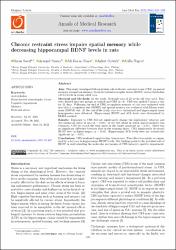Chronic restraint stress impairs spatial memory while decreasing hippocampal BDNF levels in rats
Citation
Saral, S., Sümer, A., Kaya, A.K., Öztürk, A. & Topçu, A. (2022). Chronic restraint stress impairs spatial memory while decreasing hippocampal BDNF levels in rats. Annals of Medical Research, 29(6), 525-529. http://doi.org/10.5455/annalsmedres.2021.07.487Abstract
Aim: This study investigated the potential role of chronic restraint stress (CRS) on spatial
memory, recognition memory, brain-derived neurotrophic factor (BDNF) and acetylcholine
(ACh) levels in young adult rats.
Material and Methods: In the study, 16 female rats of 12 weeks old were used. Rats
were divided into two groups as control and CRS (n=8). CRS was applied 5 hours a day
for 21 days. Following the end of CRS, recognition memory of rats was evaluated with
new object recognition test (NORT) and spatial memory was evaluated with Morris water
maze (MWM) test. At the end of the study, rats were euthanized and hippocampal tissue
homogenates were obtained. Hippocampal BDNF and ACh levels were determined by
ELISA method.
Results: Exposure to CRS did not significantly change the exploratory behavior and
discrimination index of rats (p > 0.05). In the test phase in which spatial memory was
evaluated, CRS decreased the time spent in the target quadrant (p > 0.01). There was
no significant difference between days in the training phase. CRS significantly decreased
BDNF level in hippocampus (p > 0.05). Hippocampal ACh levels were not statistically
significant (p > 0.05).
Conclusions: CRS weakened cognitive functions in rats. This effect was mainly accompanied by a decrease in hippocampal BDNF levels. Our findings point to the potential role of
BDNF in understanding the molecular mechanism of CRS-induced cognitive impairment.


















